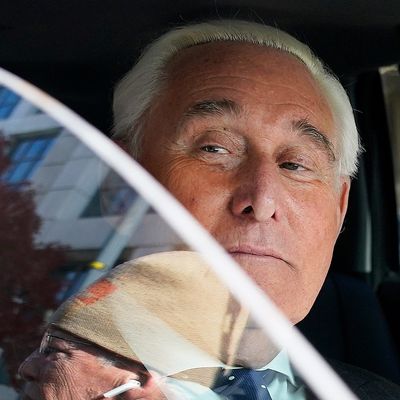
Yesterday, prosecutors recommended a nine-year prison sentence for Roger Stone, one of Donald Trump’s many criminal associates, for lying to Congress and intimidating witnesses. Late last night,Trump tweeted a flurry of messages in support of Stone, and previewing his long-apparent intent to pardon his accomplice.
Trump’s coy promise to take care of Stone is the latest step in a public communication between the two longtime partners. Stone, along with his former partner, Paul Manafort, were Trump’s two closest back channels to Russia during the campaign. Prosecutors were never able to establish just how much both men knew, and what they communicated to Trump, because neither cooperated with Robert Mueller. Stone has previously promised, “I will never roll on Donald Trump.” Trump’s all-but promise to pardon Stone or commute his sentence is the next step in completing the bargain between them.
What does Stone know? Michael Cohen, one of Trump’s criminal associates who did cooperate with prosecutors, testified to Congress:
In July 2016, days before the Democratic convention, I was in Mr. Trump’s office when his secretary announced that Roger Stone was on the phone. Mr. Trump put Mr. Stone on the speakerphone. Mr. Stone told Mr. Trump that he had just gotten off the phone with Julian Assange and that Mr. Assange told Mr. Stone that, within a couple of days, there would be a massive dump of emails that would damage Hillary Clinton’s campaign. Mr. Trump responded by stating to the effect of “Wouldn’t that be great?”
Rick Gates, another one of the Trump associates who cooperated with prosecutors, testified that he was in the car with Trump in July 2016 when Trump took a call from Stone. Gates did not hear the conversation, but Trump told him afterward that WikiLeaks would be releasing more information.
Stone, of course, had a motive to exaggerate his contacts with WikiLeaks, in order to inflate his importance to Trump. He appeared to be reliant on intermediaries to find out how the hacking organization planned to use stolen Democratic emails. Still, his testimony would flesh out the picture of Trump’s obvious eagerness to encourage and exploit the criminal theft of communications by his opponent. As a prosecutor said at Stone’s trial, “It would look really bad for his longtime associate Donald Trump” if the truth came out.
Stone threatened witness Randy Credico not to testify, and his defenders insist his threat to Credico was not serious — but even if true, he undeniably encouraged Credico to lie to prosecutors.
Mueller’s report cited ten instances of Trump obstructing justice. Making known to his associates his willingness to pardon them for keeping their mouth shut was his most effective tactic. Stone helped cover up for Trump, and the normal prosecutorial tactic of forcing underlings to flip on the boss failed, because in this case the boss has the power to pardon his associates.
The Department of Justice announces is is recommending a more lenient sentence for Stone. Officials claim the decision, which was reported after Trump’s tweet, was made beforehand:
This can’t be disproven, but it seems extremely hard to credit. William Barr’s Department of Justice has made decision after decision that benefits Trump, the merits of which run from questionable to baffling. Covering up Trump’s misconduct is easy when he has the pardon power. When he has Barr backing him up, it is trivially easy.
As confirmation that the Department’s decision was highly improper, Aaron Zelinsky, Jonathan Kravis, Adam Jed and Michael Marando, all four of the prosecutors on the Stone case, have resigned, effective immediately. This is a situation that screams out that the Department is interfering to protect Trump’s cronies.
This post has been updated.






























